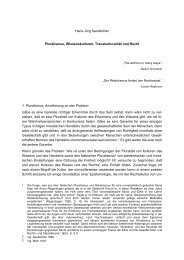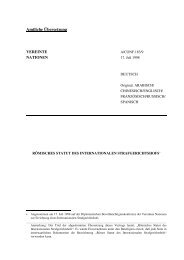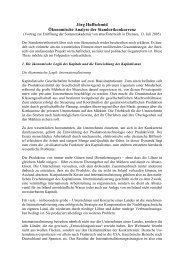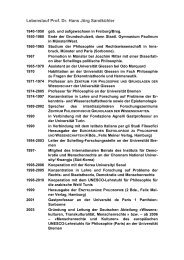Allgemeine Erklärung über Bioethik und Menschenrechte - Unesco
Allgemeine Erklärung über Bioethik und Menschenrechte - Unesco
Allgemeine Erklärung über Bioethik und Menschenrechte - Unesco
Erfolgreiche ePaper selbst erstellen
Machen Sie aus Ihren PDF Publikationen ein blätterbares Flipbook mit unserer einzigartigen Google optimierten e-Paper Software.
70<br />
non-invasive procedures, and for their subsequent processing, use and storage,<br />
whether carried out by public or private institutions. Limitations on this principle<br />
of consent should only be prescribed for compelling reasons by domestic<br />
law consistent with the international law of human rights.<br />
2. When, in accordance with domestic law, a person is incapable of giving informed<br />
consent, authorization should be obtained from the legal representative,<br />
in accordance with domestic law. The legal representative should have regard<br />
to the best interest of the person concerned.<br />
3. An adult not able to consent should as far as possible take part in the authorization<br />
procedure. The opinion of a minor should be taken into consideration as an<br />
increasingly determining factor in proportion to age and degree of maturity.<br />
4. In diagnosis and health care, genetic screening and testing of minors and adults<br />
not able to consent will normally only be ethically acceptable when they have<br />
important implications for the health of the person and have regard to his or her<br />
best interest.<br />
Article 9 – Withdrawal of consent<br />
1. When human genetic data, human proteomic data or biological samples are<br />
collected for medical and scientific research purposes, consent may be withdrawn<br />
by the person concerned unless such data are irretrievably unlinked to an<br />
identifiable person. In accordance with the provisions of Article 6.4, withdrawal<br />
of consent should entail neither a disadvantage nor a penalty for the<br />
person concerned.<br />
2. When a person withdraws consent, the person’s genetic data, proteomic data<br />
and biological samples should no longer be used unless they are irretrievably<br />
unlinked to the person concerned.<br />
3. If not irretrievably unlinked, the data and biological samples should be dealt<br />
with in accordance with the wishes of the person. If the person’s wishes cannot<br />
be determined or are not feasible or are unsafe, the data and biological samples<br />
should either be irretrievably unlinked or destroyed.













